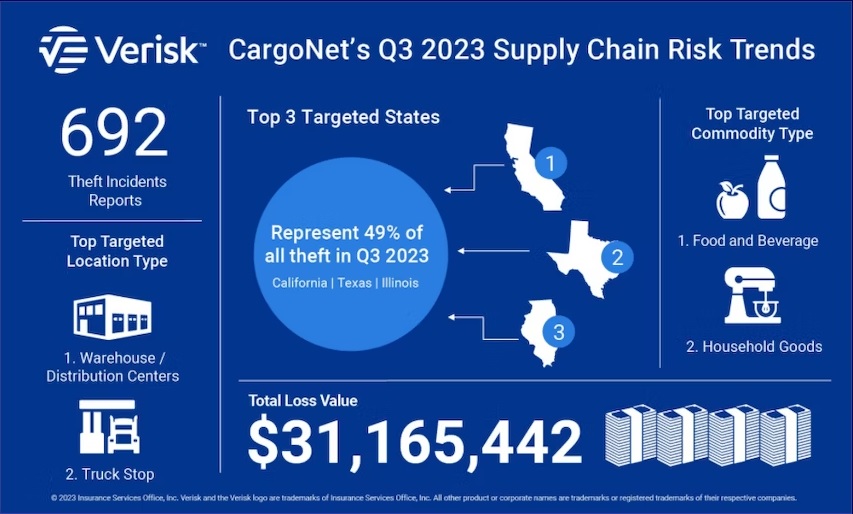During the third quarter of this year, there was a substantial rise in cargo theft incidents compared to the same period in 2022, and there’s no sign of it slowing down.
CargoNet, a theft monitoring organization, documented 692 thefts across the United States and Canada in Q3 2023, marking a 59% increase from Q3 2022. The stolen shipments amounted to over $31.1 million, as reported by CargoNet.
Similar to the second quarter of 2023, the surge can be attributed to ongoing misdirection attacks on shipments. These attacks involve criminals using stolen identities of motor carriers and logistics brokers to acquire and redirect freight away from its intended destination, allowing them to steal it.
In the third quarter of 2023, reported thefts saw an increase in every category. Documented strategic cargo theft events experienced a staggering 430% year-over-year increase, while theft of loaded conveyances, like full trailers, increased by 4% year-over-year. These types of thefts were most prevalent in California, Texas, Florida, Georgia, and Illinois.
CargoNet also noted a notable uptick in the “other” category, which encompasses various reports such as identity theft complaints, hostage loads, late shipment complaints, and other types of criminal intelligence records.
CargoNet said, “As we enter the final quarter of 2023, there is no indication that cargo theft activity will slow in the United States. We anticipate that strategic cargo theft will remain at unprecedented levels of activity throughout the quarter. We caution the industry that throughout this year, strategic cargo theft rings have picked up activity around holiday periods.”
Furthermore, CargoNet highlighted that strategic cargo theft groups have expanded their focus to include specific commodities, such as truckload shipments of metals like copper, brass, and aluminum. Additionally, they have targeted apparel, particularly officially licensed sports apparel, along with shipments of personal care and beauty products.
The organization issuing the theft warnings also raises a red flag about the evolving tactics employed by these strategic cargo theft groups. They are actively exploring new methods to carry out strategic cargo theft while avoiding the standard compliance practices typically employed by logistics brokers. Notably, these groups are showing a particular interest in committing fraud against small motor carriers or owner-operators. Their aim is to hijack accounts or persuade them to procure shipments from logistics brokers on their behalf. Both approaches are designed to circumvent identity theft checks that logistics brokers usually conduct before assigning a shipment.





